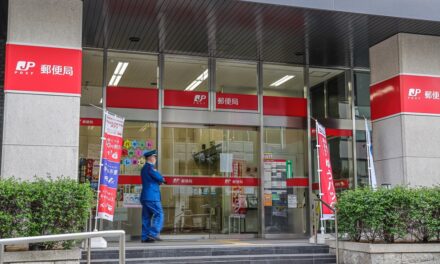
Postal Officials must obey the letter of the law (Japan Post)
THE YOMIURI SHIMBUN/DAILY YOMIURI 4th October 2001
POSTAL OFFICIALS MUST OBEY THE LETTER OF THE LAW
Postal officials must obey the letter of the law Takeshi Esaki Yomiuri Kenji Koso, a Liberal Democratic Party member of the House of Councillors, tendered his resignation on Sept. 25, only two months after his July election to the upper house, taking responsibility for a vote-soliciting scandal involving senior officials of regional postal service bureaus.
Koso, a former postal service bureaucrat, was forced by his party to resign from the Diet after 16 senior postal officials were arrested on suspicion of conducting illegal campaigns to support his bid for the upper house. Among the 16 officials involved were the incumbent head and other senior officials of the Kinki Regional Postal Services Bureau, as well as postmasters of post offices and special post offices in the Kinki region.
Special post offices are small local post offices run by influential local figures under government licenses. A special post office and the land it is built on are normally owned by a postmaster and leased to the central government. All special post office postmasters have the status of national government employees.
Investigations by the Osaka and Kyoto prefectural police headquarters showed that postal officials in the Kinki region illegally solicited votes for Koso, who was the head of the Kinki Regional Postal Services Bureau until two years ago. The investigations shed light on the campaign top officials of the Kinki postal bureau conducted on behalf of Koso. They were in violation of the Public Offices Election Law, which bans government workers from using the power of their positions to solicit votes. The officials allegedly mapped out campaign tactics and instructed post offices and special post offices to solicit votes for Koso and induce voters to join Koso's support organization.
Koso allegedly asked the Kinki bureau officials to support his election campaign. Police were reportedly considering charging him under a law that holds a candidate responsible for election law violations.
The excessive campaigns by the Koso camp apparently reflected the bureaucrats' concern over Prime Minister Junichiro Koizumi's plan to privatize the state-run postal services system. They were also attributed to the introduction of an "open-list" proportional representation system in the latest upper house election, which allowed voters to vote for either a party or a candidate. Under this system, Koso was hampered by the fact that the public was not familiar with him.
Above all, however, the scandal brought to light the tendency of government workers to forget that they must be politically neutral. One arrested official reportedly said to a police investigator: "I only did what I had done in the past. Why was I arrested this time?" Because of this, some officials regret that bureaucrats and post office officials helped uncover the illegal campaigns.
Some candidates who had careers in the former Posts and Telecommunications Ministry once boasted they could garner as many as 1 million votes under the national constituency category in the upper house elections. About 19,000 special postal offices nationwide served as their largest voting bloc.
Postal service officials reportedly referred to supporting the candidacies of former bureaucrats as their "fourth business," in addition to postal services, postal savings and post office insurance. It is contemptible of them to regard election campaigns as part of their business, but the reality is that this practice has long been unchallenged.
Postmasters of special post offices belong to two organizations. One is the Liaison Association for the Promotion of Businesses of Special Post Office Postmasters (LAPBSPOP). This is a public organization set up by the Postal Service Agency to coordinate the organization of the postmasters of special post offices. The other is the Association of Special Postal Office Postmasters (ASPOP), a voluntary organization that works to improve the working conditions of employees of special post offices. The executives are the same for both organizations.
The two organizations discussed supporting Koso during a conference of special post office postmasters held in Osaka in March. A meeting of ASPOP was set for 11 a.m. and one for LAPBSPOP for 1 p.m. at the same conference hall.
Legally, the Kinki Regional Postal Services Bureau was only entitled to convene the latter meeting, but it surmounted this obstacle by using a tricky method. The bureau gave special post office postmasters, who planned to attend the LAPBSPOP meeting, an advance notice by e-mail to come to the meeting at 11 a.m. Then the bureau sent them another e-mail changing the meeting time to 1 p.m. The bureau then called the special postmasters by telephone and orally instructed them to come to the meeting at 11 a.m.
The double-switch was apparently intended to hide the evidence of postal officials' involvement in the illegal campaign for Koso. Actually, the same postal officials served as receptionists for both the morning and afternoon meetings.
The Osaka prefectural police decided that both meetings were held at the initiative of the postal bureau for the purpose of conducting illegal campaigns for Koso.
Postal sources say the postal bureau conducted similar election campaigns for postal bureaucrats for many years through the two organizations.
It is surprising to see that a government organization that is supposed to do administrative work according to the law had taken pains to sidestep this law and conduct election campaigns. This was a clear case of the postal bureaucracy pursuing its own interests.
Voters will become apathetic if the government calls for clean elections while engaging in such illegal election campaigns.
Copyright 2001 The Daily Yomiuri Copyright 2001 The Yomiuri Shimbun/Daily Yomiuri. Source: World Reporter (Trade Mark) – Asia Intelligence Wire.












